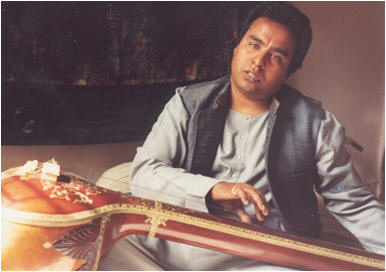Profile:

Ustad Wasifuddin Dagar, Indian Classical Vocalist
 USTAD
FAIYAZ WASIFUDDIN DAGAR
USTAD
FAIYAZ WASIFUDDIN DAGAR
Dhrupad is the oldest and most profound style of Indian classical vocal music. Dagarvani dhrupad, a genre that was nearly extinct half a century ago has prospered due to the unique dedication of the Dagar family. Ustad F. Wasifuddin Dagar represents the 20th generation of dedicated dhrupad singers in the Dagar family. He is the nephew of Ustad N. Zahiruddin Dagar and son of Ustad N. Faiyazuddin Dagar, the legendary younger “Dagar Brothers”. Though traditionally his family has always performed dhrupad as a duet, Wasif (shorted form of his name) successfully presents the dynamic of a duet in a solo performance by maintaining the distinct musical approaches and styles of both his father and uncle.
Wasif’s early training was with his uncle Ustad N. Zahiruddin Dagar, and his father Ustad N. Faiyazuddin Dagar. Wasif also had the good fortune of the tutelage of his grand uncle Ustad Rahimuddin Khan Dagar, a dhrupad exponent and his grandfather’s younger brother. Other elders including uncles Ustad N. Aminuddin Dagar, and Ustad N. Mohiuddin Dagar (renowned vina virtuoso) have also greatly influenced him. Wasif continues to benefit from the knowledge, experience and guidance of his uncles Ustad. R. Fahimuddin Dagar, Ustad Z. Fariduddin Dagar, and Ustad. H. Sayeeduddin Dagar.
The untimely demise of his father in February 1989 paired Wasif with his uncle and teacher Ustad N. Zahiruddin Dagar, who taught him the crucial aspects of jugalbandi (duet) a specialty of the Dagar family. As the “Dagar duo” they toured extensively. Their concerts and music was the subject of the French television documentary “Dagarvani” in 1992. They have also recorded in Switzerland, India, and America with major recording labels. Since the demise of his uncle Ustad N. Zahiruddin Dagar in 1994, Wasif has been carrying on the tradition of Dagarvani solo. His rendition of dhrupad is a unique blend of his uncle’s training, his father’s quality of voice and temperament, and his in-depth knowledge of dhrupad tradition. His innovative alap notes are spacious and colorful, ranging across the three octaves delineating the personality of the raga in great clarity. His gamaks are fast and sonorous yet retain the softness and sweetness of the raga inherent in dhrupad renditions. Over the years he has developed subtle variations and improvisations by modulation of volume and sound application to present many shades of the same musical phrase. The composite effect of his dhrupad rendition remains traditional, merging techniques and styles of both his teachers. His is very popular with young listeners for his lively lecture demonstrations illustrating old Vedic technicalities through metaphors from daily life.
Wasif performs regularly and extensively on Indian
television and radio, at music festivals, and concerts. He performed for the
UNESCO in France, and also toured the Netherlands, Belgium, Switzerland, Hungary
in 1998, for the United Nations Peace Summit, and the World Festival of Scared
Music of the Dalai Lama in 2001. In several very successful concert tours, he
has performed extensively in the United States including at the Smithsonian
Institution in Washington DC, at Harvard University, and several other
prestigious venues. He has also toured Japan and Europe. A May-June 2003 concert
tourwas organized in France, Switzerland, the
Netherlands, and Finland. His  performances have received rave reviews
in The Washington Post, The New York Times, and other world press. Despite his
active concert schedule, Wasif still finds time to teach many talented
youngsters grooming the next generation of torchbearers for this ancient august
tradition.
performances have received rave reviews
in The Washington Post, The New York Times, and other world press. Despite his
active concert schedule, Wasif still finds time to teach many talented
youngsters grooming the next generation of torchbearers for this ancient august
tradition.
Check out his Review in New York Times
Check out his Review of New York Performance
Check out his Interview in New York